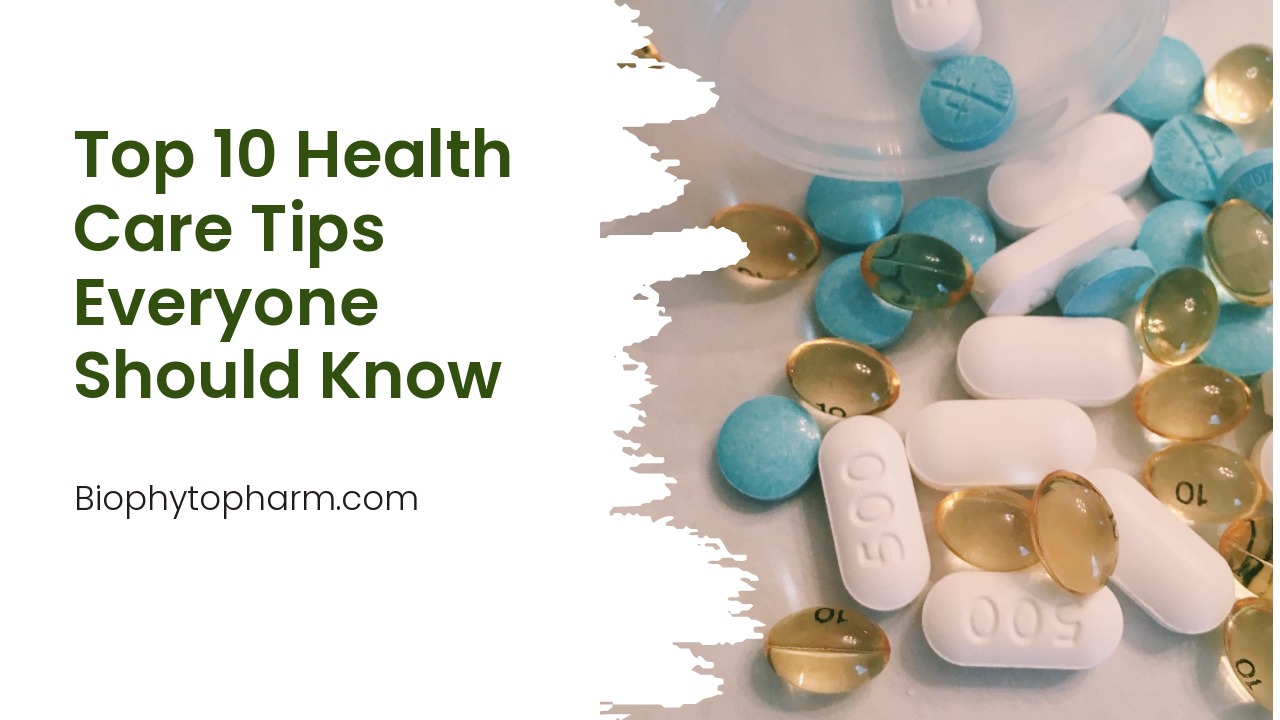Top 10 Health Care Tips Everyone Should Know
Introduction
The world of health care is constantly changing and evolving. It can be hard to keep up with the latest research and developments. However, it is important to be as informed as possible about your health and the healthcare options available to you.
In this article, we will be discussing the 10 most important healthcare tips that everyone should know. These tips range from simple lifestyle changes to more serious medical advice. By following these tips, you can improve your health and well-being and make the most of the healthcare system.
1. Eat healthy and exercise
It is no secret that eating a healthy diet and exercising regularly is important for your health. Numerous studies have shown that these lifestyle choices can help to prevent a wide range of diseases, including heart disease, stroke, and diabetes. Eating a healthy diet means eating a variety of nutrient-rich foods, including fruits, vegetables, whole grains, and lean protein. Exercise, on the other hand, helps to improve your cardiovascular health and can also help to reduce your risk of developing chronic diseases. So, if you want to be as healthy as possible, be sure to eat healthy foods and get plenty of exercises.
2. Get regular check-ups and screenings
Another important healthcare tip is to get regular check-ups and screenings. This is especially important for people who are at an increased risk of developing certain diseases, such as cancer. There are a number of screenings that are recommended for people of all ages. For example, all adults should get a colonoscopy every 10 years starting at age 50. Women should also get a Mammogram every year starting at age 40. So, be sure to talk to your doctor about which screenings are right for you, and make sure to stay up-to-date on all of your screenings.
3. Stay up-to-date on vaccinations
Vaccinations are one of the most important tools in the fight against the disease. Vaccinations help to protect you from a number of serious and deadly diseases, including measles, polio, and HPV. It is important to note that vaccinations are not just for children. Adults also need to stay up-to-date on their vaccinations. For example, all adults should get a tetanus booster every 10 years. So, make sure you are up-to-date on all of your vaccinations, and talk to your doctor about which vaccinations are right for you.
4. Manage stress
Stress is a normal part of life, but it can take a toll on your physical and mental health if it is not managed properly. Stress can cause a number of health problems, including anxiety, depression, and high blood pressure. There are a number of ways to manage stress, including exercise, relaxation techniques, and talking to a therapist. Be sure to find a stress management technique that works for you and make sure to take some time for yourself every day.
5. Quit smoking
Smoking is one of the leading causes of preventable death in the United States. Cigarette smoking is responsible for a number of health problems, including lung cancer, heart disease, and stroke. If you smoke, the best thing you can do for your health is to quit. quitting smoking is not easy, but there are a number of resources available to help you. Talk to your doctor about quitting smoking and make a plan to quit.
6. Limit alcohol consumption
Drinking alcohol in moderation can be part of a healthy lifestyle. However, drinking too much alcohol can lead to a number of health problems, including liver disease, heart disease, and cancer. If you drink alcohol, it is important to do so in moderation. The American Heart Association recommends that men consume no more than two drinks per day and that women consume no more than one drink per day. So, if you drink alcohol, be sure to do so in moderation and talk to your doctor about how much alcohol is safe for you to consume.
7. Get enough sleep
Getting enough sleep is important for your physical and mental health. When you sleep, your body repairs itself, and your brain processes information from the day. Most adults need seven to eight hours of sleep per night. However, some people need more or less sleep. If you are not getting enough sleep, you may feel tired during the day and have trouble concentrating. If you think you may not be getting enough sleep, talk to your doctor. They can help you find ways to get more sleep and make sure you are getting the right amount of sleep for your needs.
8. Practice safe sex
Sexual activity is a normal and healthy part of life. However, it is important to practice safe sex in order to avoid sexually transmitted diseases (STDs). There are many ways to practice safe sex, including using condoms, getting tested for STDs, and talking to your partner about their sexual history. Be sure to talk to your doctor about how to practice safe sex and make sure you are taking all the necessary precautions.
9. Wash your hands regularly
Washing your hands is one of the simplest and most effective ways to prevent the spread of disease. Handwashing removes germs from your hands that can cause illness. It is important to wash your hands regularly, especially before you eat after you use the bathroom and after you cough or sneeze. If you are not able to wash your hands, you can use hand sanitizer.
So, make sure you are washing your hands regularly and always carry hand sanitizer with you when you are not able to wash your hands. 10. Conclusion This concludes our list of the 10 most important healthcare tips everyone should know. By following these tips, you can improve your health and well-being and make the most of the healthcare system.





